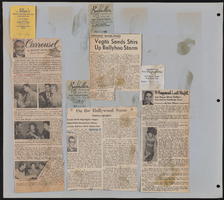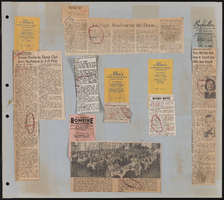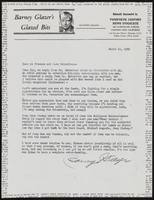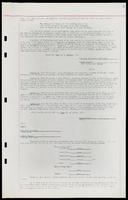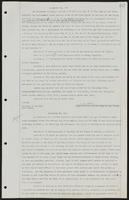Search the Special Collections and Archives Portal
Search Results
Tom Hawley Papers
Identifier
Abstract
The Tom Hawley Papers (approximately 1955-2019) contain the personal papers of Las Vegas, Nevada based traffic and transportation reporter, Tom Hawley. The collection primarily includes physical and digital materials that represent Hawley's interests in Las Vegas history; transportation issues in the Las Vegas Valley, including the Las Vegas Monorail and Resort Corridor Project; and his work as a traffic and transportation reporter for KSNV Channel 3. Materials from KSNV include video clips and transcripts of
Archival Collection
Mabel Hoggard Papers
Identifier
Abstract
The Mabel Hoggard Papers (1903-2011) contain materials related to Hoggard's career as a Las Vegas, Nevada elementary school teacher, her research and civic interests in Las Vegas's predominantly African American Westside communities, and her engagement with civil rights issues. The collection also contains materials about Hoggard's life, including biographical newspaper articles about her childhood, education, work, and family. The collection includes lesson plans, scrapbooks, awards, correspondence, photographs, and physical objects such as a vinyl record and political pins. The bulk of the collection focuses on her life in Las Vegas from approximately 1946-1989.
Archival Collection

Meeting minutes for Consolidated Student Senate, University of Nevada, Las Vegas, October 21, 1975
Date
Archival Collection
Description
Text
Celesta Lowe Papers
Identifier
Abstract
Celesta Lowe Papers (1943-1995) consist of clippings, published writings ("Echoes from the Archives" and "Southwestern Bookshelf" columns), correspondence, and photographs related to Southern Nevada
history. Also included are National League of American Pen Women and Pen Hens material.
Archival Collection
University of Nevada, Las Vegas Division of Educational Outreach Records
Identifier
Abstract
The University of Nevada, Las Vegas Division of Educational Outreach Records (1971-2019) contain correspondence, planning information, promotional materials, photographs, and newspaper clippings about the history of the division and commemorative events such as the 25th and 40th anniversaries. The majority of the collection materials are comprised of course catalogs, directories, student journals, member handbooks, scrapbooks, and council meeting minutes for the division's lifelong learning programs for nontraditional students: the Extended Education Center for Lifelong Learning (EXCELL) and the Osher Lifelong Learning Institute (OLLI). Materials also include digital files of jazz performances from OLLI's Jazz Appreciation class, a video interview about OLLI, and recording of an OLLI panel featuring World War II veterans.
Archival Collection

